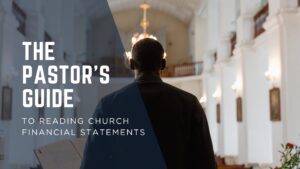Two large ministries in California recently found themselves facing fines in the tens of thousands of dollars after being audited by the Employment Development Department (EDD). Their mistake? Misclassifying employees as 1099 contractors. It’s a mistake that’s all too common and can have devastating financial consequences for churches and ministries. If your church isn’t clear on the difference between a 1099 contractor and a W-2 employee, you could be next.
Let’s break down what you need to know to avoid falling into the same trap.
The ABC Test Explained
What Is the ABC Test?
In California, worker classification is no longer as simple as signing a contract with someone and calling them an independent contractor. Under Assembly Bill 5 (AB5), California uses the ABC Test to determine if a worker is an employee or a contractor. In California, anyone working for compensation is assumed to be an employee unless proven otherwise by passing all three parts of the ABC Test; this test places the burden on the employer to prove that the worker meets all three of these conditions in order to classify them as an independent contractor.
If even one of these criteria isn’t met, the worker should be classified as an employee, not an independent contractor.
The EDD (Employment Development Department) determines whether a worker is an employee or independent contractor based on these tests, regardless of what the worker prefers or what the contract outlines. Simply put, the EDD only cares about whether the worker meets the criteria outlined in the test—not the labels used in agreements.
“In California, everyone is presumed to be an employee unless proven otherwise by passing all three parts of the ABC Test”
The Impact on Churches
Many churches hire musicians, part-time administrators, childcare workers, and event coordinators and assume that because these individuals work part-time or on specific projects, they qualify as contractors. However, if their work is central to your church’s operations—say, leading worship or managing church programs—they may actually need to be classified as employees. This is where many churches make costly errors.
California’s Strictness Compared to Other States
California is far stricter than most states when it comes to worker classification. While many states have more lenient tests for determining independent contractor status, California’s ABC Test is one of the most rigid in the country, making it significantly harder for churches and businesses to classify workers as contractors.
Real-Life Consequences of Misclassification
Case Study: Ministries Hit with Tens of Thousands in Fines
The two ministries I mentioned earlier learned this lesson the hard way. Both were audited by the EDD after some of their workers filed for unemployment. These workers had been treated as independent contractors, but because their roles were essential to the ministries’ operations, the EDD ruled they should have been classified as employees. As a result, the ministries had to pay hefty penalties in addition to backpaying the owed payroll taxes, with total costs reaching tens of thousands of dollars. For churches and ministries that run on tight budgets, these kinds of unexpected expenses can be devastating.
“The EDD doesn’t care what your contract says—worker classification is based on the nature of the job, not the paperwork.”
Navigating AB5 and Exemptions
Understanding Exemptions and Special Cases
It’s important to note that AB5 does include some exemptions. Certain professionals, such as doctors, lawyers, and even freelance writers, are exempt from the ABC Test and instead fall under the Borello Test, which is more lenient and looks at multiple factors, such as control over work and the nature of the relationship. However, for most churches, these exemptions likely won’t apply. Roles like worship leaders, administrators, and program coordinators will almost always fall under the ABC Test and therefore should be treated as employees.
California’s ABC Test vs. IRS Guidelines
One common area of confusion for churches and ministries is the difference between California’s ABC Test and the IRS rules for independent contractors. While the IRS uses a broader “control test” that evaluates factors like behavioral control, financial control, and the relationship between the parties, California’s ABC Test is much more strict. This means that even if a worker qualifies as an independent contractor under federal guidelines, they may still be classified as an employee under California law.
Practical Steps to Stay Compliant
How to Properly Classify Workers
To avoid falling into the misclassification trap, here are some practical steps your church should take:
- Review All Worker Relationships: Use the ABC Test to evaluate each worker. If you’re uncertain, it’s best to consult a labor law expert who can guide you through the nuances.
- Document Everything: If you’re hiring independent contractors, make sure you have thorough documentation, including contracts that clearly define the scope of work and evidence that they operate as an independent business (e.g., invoices, business cards, or multiple clients).
- Reassess Regularly: Ministries change and so do roles within your church. Regularly review the classifications of your staff to ensure you’re in compliance with the law.
Our Recommendation
While we aren’t legal experts and this should not be considered legal advice, we strongly recommend that if there is any doubt about whether a worker should be classified as an employee or a contractor, err on the side of caution and classify them as an employee. It’s far better to handle the additional costs of employee status than face potential fines, penalties, and back taxes if you’ve misclassified someone
If you have any doubt about whether someone should be an employee or contractor, it’s safer to classify them as an employee.
What to Do if You’re Audited
No one wants to get a notice from the EDD, but audits do happen, either through random selection or after a worker files a claim. Here’s how you can prepare:
- Gather Documentation: You’ll need to present payroll records, 1099 forms, contracts, and tax returns. Be organized and ready to demonstrate compliance.
- Consult Legal Help: If you’re under investigation, it’s always a good idea to get advice from a qualified attorney who understands California’s complex labor laws.
Avoid Costly Errors
Misclassifying employees as independent contractors may seem like a way to save money, but it can lead to crippling penalties and legal challenges down the road. As California continues to crack down on worker misclassification, it’s more important than ever for churches and ministries to understand the rules and stay compliant. Take the time to review your worker classifications today—before the EDD comes knocking.






































